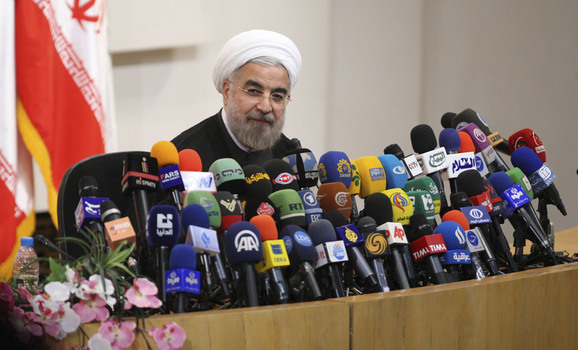IN THE MEDIA
No time for nuclear honeymoon as Iran changes guard
July 2, 2013 | Colin Rubenstein

Colin Rubenstein
Canberra Times – 2 July 2013
The election of Hassan Rouhani as Iran’s next president – the most moderate, or rather, the least extreme of Iranian Supreme Leader Ayatollah Khamenei’s hand-picked slate of candidates – certainly appears to signal that the Iranian people want internal reforms, relief from their highly repressive regime and relief from international sanctions over their illegal nuclear program.
What is unclear is whether Teheran’s new frontman would be willing to support a nuclear deal that will satisfy the basic requirements for such a settlement, or moreover, whether he would be able to persuade Khamenei – who sets Iranian nuclear policy – to agree.
As a former chief negotiator for the regime on the nuclear issue, Rouhani took pride in his ability to manipulate negotiations and defuse international pressure without having to sacrifice Iranian nuclear ambitions. As Rouhani bragged in a speech in 2004: “While we were talking with the Europeans in Teheran, we were installing equipment in parts of the [nuclear conversion] facility in Isfahan. By creating a calm environment, we were able to complete the work there.”
More recently, Rouhani ran on the slogan that Iranian jobs were more important than nuclear ambition, but was this merely another empty campaign promise from a candidate pandering to Iran’s growing number of unemployed?
In his first press conference following his election as President, Rouhani introduced preconditions for direct Iranian talks with the US – including the easing of sanctions and conceding the core of Iran’s position on the nuclear issue before negotiations even begin.
Time has run out for such shenanigans and doubletalk. That’s just another reason why calls for some sort of a “grace period” for Rouhani over the nuclear issue must be rejected. While Iran’s political machine may have paused for an election, there is no suggestion that its centrifuges have taken a holiday.
Nor can Rouhani expect to buy time to acquaint himself with the situation at hand. While he has taken pains to distance himself from the regime, Rouhani is certainly no outsider and has been deeply involved in Iran’s nuclear program for years.
In the wake of Iranian elections, it’s certain negotiations are going to be the subject of heightened expectations after 10 rounds of parlays between Iran and the P5+1 over the past 17 months. These are the same frustrating talks which International Atomic Energy Agency head Yukiya Amano (IAEA) said had been “going around in circles”.
Rouhani, who led talks with the Europeans between 2003 and 2005 that saw temporary restraint on certain elements of Iran’s nuclear program, may well seek to strike a hard bargain that he can sell to his bosses and yet erode support for strengthened (or continued) sanctions among the members of the P5+1 and the UN Security Council.
Here is where the real danger lies, because a likely scenario will be that the maximum concession that Iran may be prepared to offer in order to have sanctions removed will be less than the minimum that the international community can afford to accept.
Iran will be seeking a deal that will allow it to continue to enrich uranium on its own soil. Given Iran’s track record for conducting advanced nuclear enrichment on the sly, it is crucial that the international community deprive Iran of this opportunity.
The red lines of any negotiated settlement over Iran’s nuclear program must remain well-defined.
The P5+1’s demand for Iran to halt all 20% enrichment activities, transfer all 20% enriched uranium to a third country under IAEA custody and shut down its Fordow enrichment facility must be maintained as only a crucial first step towards a comprehensive negotiated solution – not an end in itself and not a concession worthy of ending or severely curtailing sanctions.
The P5+1 must remember from experience that any deal which would leave Iran with options for resuming its pursuit of nuclear weapons capability after a short pause would be a waste of time.
The content and enforcement of any potential negotiated settlement with Iran must be handled with the same detail-oriented care and determination that went into crafting the sanctions that, it is to be hoped, may finally be bringing Iran to the table with an intention to deal, not to stall.
Furthermore, at every step of the way during the negotiations and, in the event of a deal, during implementation, all options must unambiguously remain on the table as a potent reminder of the world’s resolve.
Time is short, stakes are high and there are no second chances. Rouhani, who has promised the Iranian people a return to prosperity, must be made to understand that Iranian economic salvation will remain a pipe dream unless the rulers he represents are prepared to abandon their nuclear weapon ambitions transparently, verifiably, and once and for all.
As Mideast Quartet envoy Tony Blair told the Presidential Conference in Jerusalem on June 19: “We should be determined to overcome the threat from Iran. Those who have power in Teheran should feel our resolve and understand that we will not back down. Of course, every military option is something we do not want, but a nuclear Iran [would be] the worst thing.”
Tags: International Security





